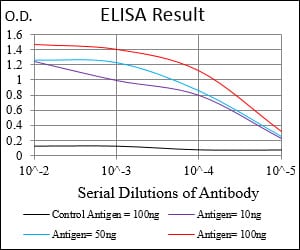
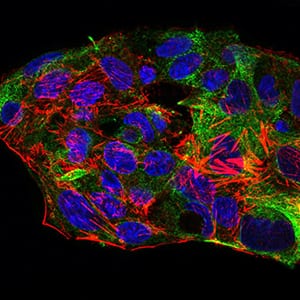
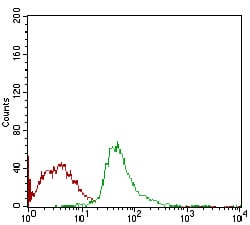
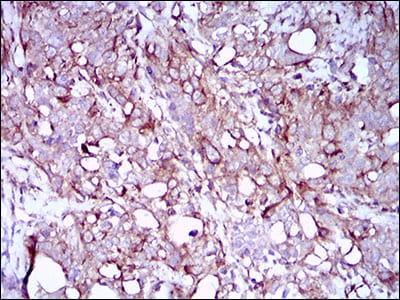
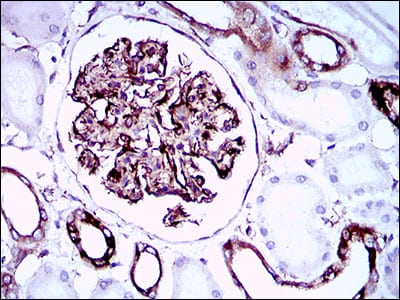
| WB | 咨询技术 | Human,Mouse,Rat |
| IF | 咨询技术 | Human,Mouse,Rat |
| IHC | 1/200 - 1/1000 | Human,Mouse,Rat |
| ICC | 1/200 - 1/1000 | Human,Mouse,Rat |
| FCM | 1/200 - 1/400 | Human,Mouse,Rat |
| Elisa | 1/10000 | Human,Mouse,Rat |
| Aliases | COR1; SCP3; SPGF4 |
| Entrez GeneID | 50511 |
| clone | 6F9C5 |
| WB Predicted band size | 27.7kDa |
| Host/Isotype | Mouse IgG1 |
| Antibody Type | Primary antibody |
| Storage | Store at 4°C short term. Aliquot and store at -20°C long term. Avoid freeze/thaw cycles. |
| Species Reactivity | Human |
| Immunogen | Purified recombinant fragment of human SYCP3 (AA: 27-128) expressed in E. Coli. |
| Formulation | Purified antibody in PBS with 0.05% sodium azide |
+ +
以下是关于SYCP3抗体的模拟参考文献示例(仅供学术参考,实际文献需通过数据库验证):
---
1. **文献名称**: *SYCP3 is required for synaptonemal complex assembly and homologous chromosome pairing in mouse meiosis*
**作者**: Yuan L, et al.
**摘要**: 本研究利用SYCP3抗体通过免疫荧光技术,揭示了SYCP3蛋白在小鼠减数分裂联会复合体形成中的关键作用。实验表明SYCP3缺失会导致同源染色体配对失败,证实其是生殖细胞发育的必需因子。
2. **文献名称**: *Antibody-based analysis of SYCP3 mutations in human azoospermia*
**作者**: Miyamoto T, et al.
**摘要**: 通过SYCP3抗体检测人类无精子症患者睾丸活检样本,发现SYCP3基因突变与减数分裂停滞相关,表明该抗体在男性不育诊断中的潜在应用价值。
3. **文献名称**: *Structural insights into SYCP3 organization in the synaptonemal complex*
**作者**: Baier A, et al.
**摘要**: 结合SYCP3抗体的免疫电镜技术,解析了SYCP3蛋白在联会复合体中的空间构象,阐明其通过C端结构域介导染色体轴组装的功能机制。
4. **文献名称**: *SYCP3 expression dynamics during germ cell development in rats*
**作者**: Wang PJ, et al.
**摘要**: 利用SYCP3抗体追踪大鼠生殖细胞发育过程,发现其在减数分裂粗线期高表达,而在精子形成后期降解,提示其在染色体动态调控中的阶段特异性功能。
---
**提示**:以上为模拟内容,实际引用请通过PubMed、Web of Science等平台检索关键词“SYCP3 antibody”并筛选近年高被引文献。
The SYCP3 antibody is a crucial tool in studying meiosis, a specialized cell division process essential for gamete formation. SYCP3 (Synaptonemal Complex Protein 3) is a key structural component of the synaptonemal complex (SC), a proteinaceous framework that mediates pairing, recombination, and segregation of homologous chromosomes during meiosis. SYCP3 localizes to the lateral elements of the SC, stabilizing chromosome axes and ensuring proper synapsis. Its expression is meiosis-specific, peaking during prophase I.
Antibodies targeting SYCP3 are widely used in reproductive biology and cancer research to visualize meiotic progression, assess chromosomal synapsis, and detect meiotic errors linked to infertility or genomic instability. In immunofluorescence, they highlight SC structures in germ cells, enabling stage-specific analysis of meiosis. Western blotting with SYCP3 antibodies helps quantify protein levels, often applied in studies exploring genetic mutations, environmental toxins, or pharmacological agents affecting meiosis. Additionally, SYCP3 serves as a biomarker in germ cell tumors, where ectopic expression may indicate meiotic reprogramming in cancer cells.
These antibodies are typically validated in model organisms (mice, humans) and are pivotal for understanding fertility disorders, meiotic regulation, and reproductive toxicology. Their specificity and reliability make them indispensable in both basic and clinical research contexts.
×